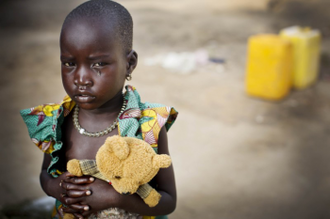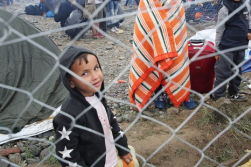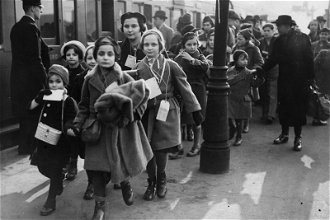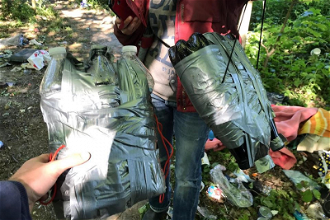Walking a mile in the shoes of a child

image: UNICEF
In "To Kill a Mocking Bird" Atticus Finch advises his daughter to "walk a mile in another person's shoes" before she passes judgment on them. What follows is drawn from young people we have met in the course of our work at Article 1, a small charity supporting asylum seekers from Sudan. As churches across the world mark Refuge Week, please spend a moment walking in the shoes of a child refugee:
Imagine you are fourteen years old, living in Sudan. One day the air force bombs your town, and then sends in government soldiers and their proxy militia on camel-back. They kill your brothers, and gang rape and torture your mother and sisters. You survive the first attack, but a week later you hear the thunder of camel's hooves, and know another assault is imminent. You and your remaining family escape with only what you can carry: your younger siblings, and your father's savings.
Your father tells you the ruling regime wants to eliminate everyone who isn't Arab and Muslim, and since your family is black and African you head for Britain, the former colonial power. Your great-grandfather once told you, "At least when the British were here in Sudan, they stopped us fighting each other." He was only half joking. Your father tells you the United Kingdom is a land of laws and impartial institutions, and a beacon of democracy - all of which you wish existed in Sudan.
Using your family savings, you fly to London. You are fortunate your father has enough money because you are spared the prospect of a voyage across the Mediterranean in an over-crowded, leaking boat.
When you land in the UK, your father tries to claim asylum under the Universal Declaration of Human Rights, the international law that recognises your well-founded fear of persecution back in Sudan. Yet, every official you encounter seems to be ignorant or indifferent to the situation facing your ethnic group at home. In addition, they ask your father to prove he's from the ethnic group that is being persecuted. Where are your documents, they ask? Through a translator, your father tries to explain he had less than a minute to escape before the government's troops arrived, so he only thought to collect your savings.
The interviews go on for days and weeks, as your family awaits a decision about their refugee status. Even though you cannot understand what is being said in these meetings, you know your father is disbelieved and treated like a criminal. Even the torture marks on your sisters are queried. You've never seen your father so small and vulnerable. All your life you assumed he was strong and knew all the answers. Now, he is trying to please the officials, smiling foolishly at them although he doesn't know what's happening, his dignity gone. You will never hold him in the same respect again.
Finally, because you are fortunate, your family is put in temporary accommodation while your asylum claim is assessed. The officials say you look sixteen or older, not fourteen, as you claim, so you cannot go to school, even though you had planned to be a doctor. Your younger siblings try hard to learn English, but everything is unfamiliar. Some of the other schoolchildren insult them, repeating what their parents have told them: that asylum seekers are just scroungers and cheats, and that they are given thousands of pounds a month by the government, while English people suffer. Your siblings tell you they feel they must be twice as good as the other students. Yet, they work hard and adapt well because they want to fit in. Your parents are alarmed by how quickly they pick up some less-attractive British habits.
Your father worries all the time that officials will come early one morning to deport the family back to Sudan. It is hard to settle down to daily life here because you know what would be in store at the end of a flight back home: arrest, torture and worse. You and your father are not allowed to work, although you want to, so you volunteer at nearby projects, hoping local people will resent you less if they see you making an effort.
You know you are lucky to be in the UK, but you live in limbo, unable to make plans. Every day you brace yourself for something else bad to occur, another shock. You don't know it now, but that feeling will stay with you for the rest of your life. In the future you will find it hard to form relationships, subconsciously fearing you will lose the people you love, or have to leave home abruptly.
You know how fortunate you are to have parents because if you had been alone you might have been put in a care home away from which traffickers lure children. Of the 25,000 unaccompanied children who have arrived in Europe, 10,000 have simply vanished into criminal gangs, brothels and sweat shops. You are also grateful not to be in a detention centre, waiting to be deported, because you've heard terrible stories about guards raping girls and stealing refugees' money.
Months and years pass, as your family waits to hear if they have leave to remain in the UK. You have learned to speak English, and you are now your parents' interpreters. Your roles have been reversed; the child caring for the bewildered adults, responsible for their interactions with the outside world. You assure them everything will be okay, but you are often afraid. Nevertheless, you keep your dream alive: one day, somehow, you will become a doctor. You are certain of it.
Read more about Article 1 here: www.article1.org/





















